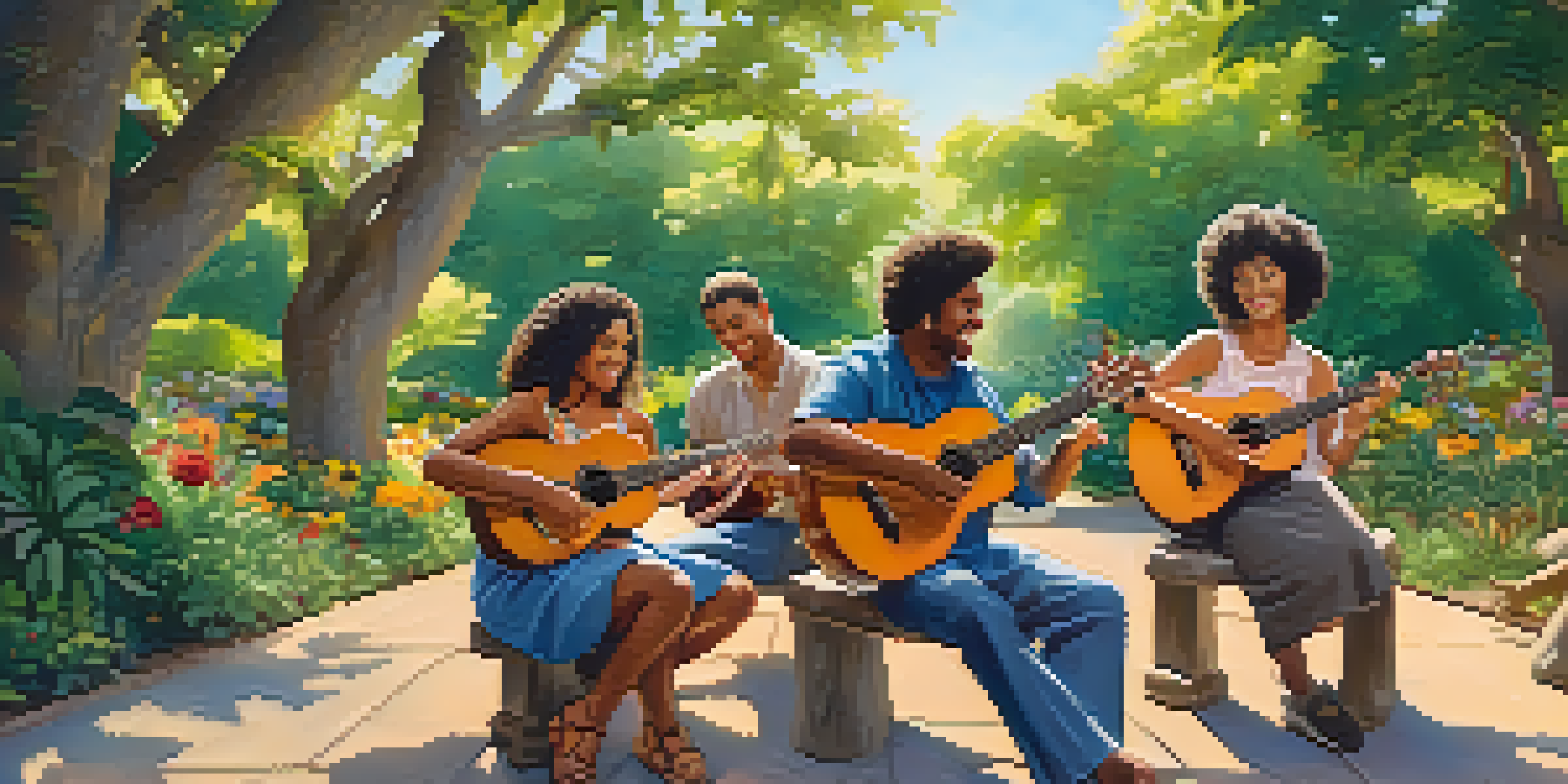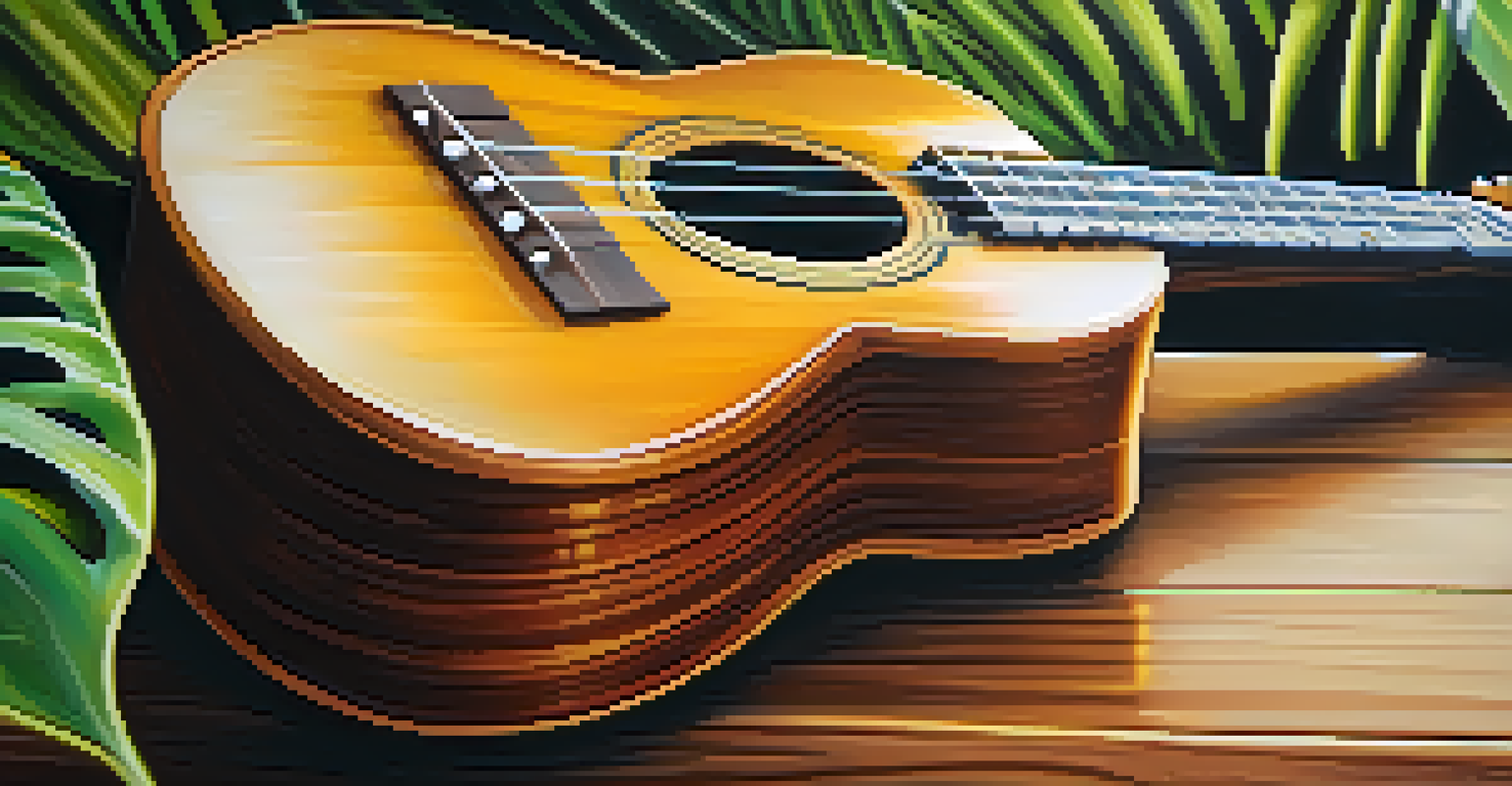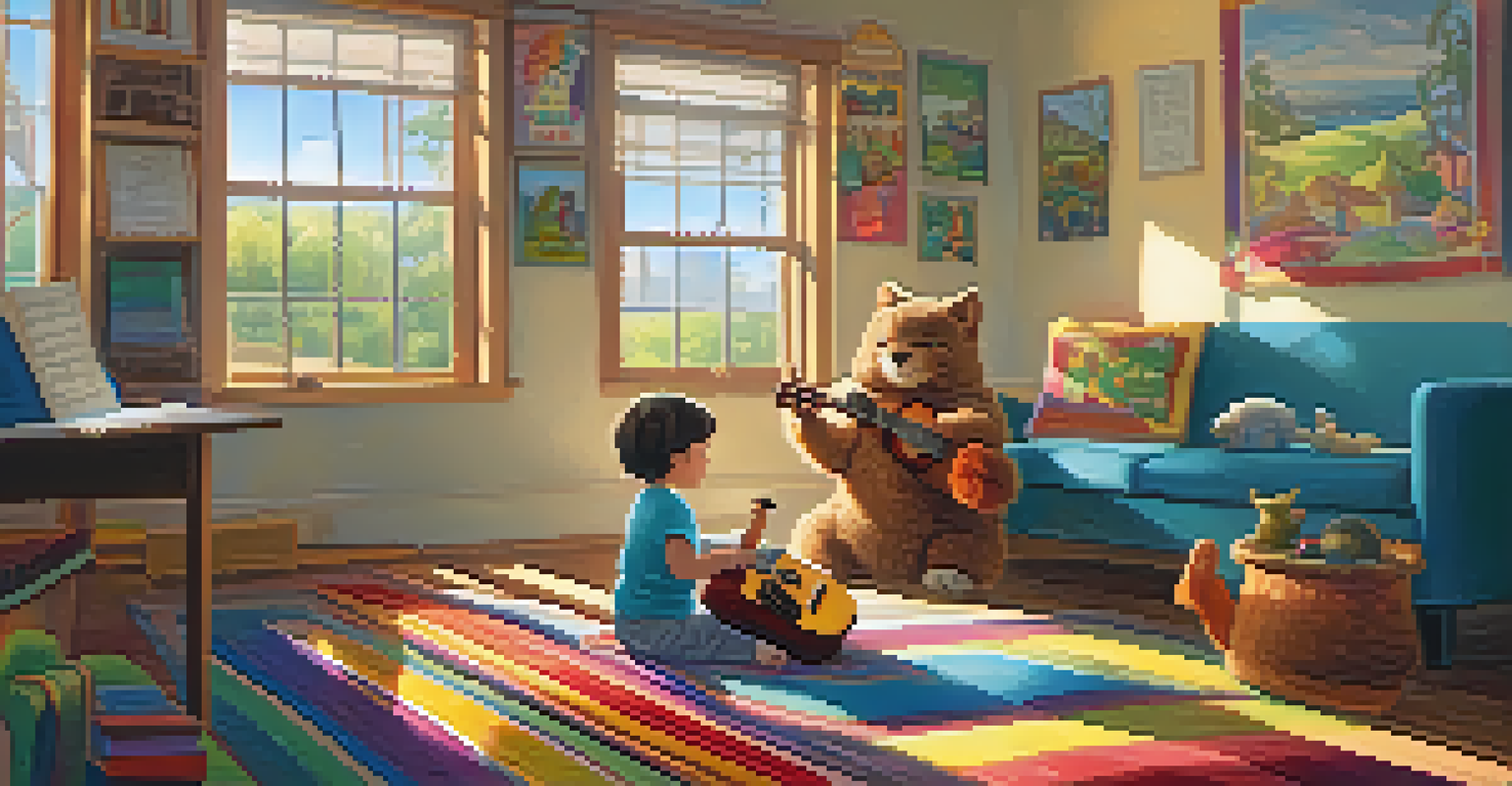The Resurgence of the Ukulele in 21st Century Pop Music

A Brief History of the Ukulele's Popularity
The ukulele, often associated with Hawaiian music, has roots that trace back to the 19th century. Originally brought to Hawaii by Portuguese immigrants, it quickly became a staple in local music. Its light, cheerful sound made it popular at social gatherings, and it captured the hearts of many, leading to its rise in the early 20th century. However, by the mid-century, the instrument faded from mainstream popularity, overshadowed by guitars and other instruments.
The ukulele is a small instrument with a big heart, capable of bringing people together through the universal language of music.
Despite its decline, the ukulele maintained a loyal following among enthusiasts and musicians. Small gatherings, online forums, and ukulele clubs kept the spirit alive, nurturing a community that appreciated its unique charm. As the internet began to flourish, so did the ukulele's reach, allowing it to be rediscovered by a new generation of musicians and fans. The revival was not just about playing the instrument; it was about embracing a joyful, accessible way of making music.
This resurgence in popularity set the stage for the ukulele to make a dramatic comeback in the 21st century. With its portability and ease of learning, it became a favorite for beginners and seasoned musicians alike. As pop music began to evolve, the ukulele found its way back into the limelight, influencing a range of genres and artists.
The Ukulele in Modern Pop Music
In recent years, the ukulele has made significant inroads into pop music, featuring prominently in songs by a variety of artists. From the catchy hooks in Jason Mraz's 'I'm Yours' to the upbeat vibe in Train's 'Hey, Soul Sister,' the ukulele adds a distinct flavor that resonates with listeners. Its cheerful sound complements many pop melodies, making it a popular choice for songwriters looking to create something uplifting.

Moreover, the instrument's versatility allows it to blend seamlessly with different musical styles. Whether it's indie pop, folk, or even rock, the ukulele has proven itself capable of enhancing a song's emotional depth. This adaptability has led to collaborations across genres, showcasing the instrument's unique ability to connect musicians and audiences. As a result, the ukulele has become synonymous with a light-hearted, feel-good vibe that many modern songs strive to achieve.
Ukulele's Rise in Modern Music
The ukulele has seen a resurgence in popularity, especially in pop music, thanks to its cheerful sound and adaptability across genres.
Social media and streaming platforms have also played a crucial role in this resurgence. Artists are not only sharing their ukulele-infused tracks but also posting tutorials and performances that inspire others to pick up the instrument. This community-driven approach has created a vibrant ecosystem where the joy of playing the ukulele is celebrated and shared, further cementing its place in contemporary pop culture.
Influential Ukulele Artists of Today
Several artists have pioneered the ukulele's resurgence in pop music, each bringing their unique style and approach. One of the most notable figures is Israel Kamakawiwo'ole, whose rendition of 'Somewhere Over the Rainbow' continues to be a beloved classic. His soulful fusion of traditional Hawaiian music with contemporary pop has introduced countless listeners to the beauty of the ukulele, inspiring many to explore the instrument further.
Music is a world within itself; it’s a language we all understand, and the ukulele speaks it beautifully.
Another key player is Ed Sheeran, who has embraced the ukulele in various performances and songs. His use of the instrument showcases its ability to complement heartfelt lyrics and melodic hooks. Sheeran's influence has certainly contributed to the ukulele's visibility, helping to inspire a new wave of musicians interested in incorporating it into their work.
Moreover, artists like Taylor Swift and Vance Joy have also utilized the ukulele in their tracks, demonstrating its versatility. Each artist brings their unique flair, but the common thread is a celebration of the instrument's charm and simplicity. This growing list of ukulele advocates highlights its continued relevance in the music industry and its appeal to both artists and audiences alike.
The Ukulele's Role in Music Education
The ukulele's resurgence isn't just limited to pop music; it's also making waves in music education. Its small size and relatively simple chord structures make it an ideal instrument for beginners. Many educators are incorporating the ukulele into their teaching methods, allowing students to engage with music in a fun and approachable way. This hands-on experience fosters a love for music that can last a lifetime.
In classrooms around the world, students are finding joy in learning the ukulele, often leading to increased participation in music programs. The instrument's cheerful sound and ease of play create an inviting atmosphere, encouraging creativity and collaboration among students. By introducing the ukulele early in their musical journey, educators are helping to cultivate the next generation of musicians.
Educational Benefits of Ukulele
Its simplicity and engaging nature make the ukulele an ideal instrument for music education, fostering creativity and collaboration among students.
Moreover, online resources and communities have emerged to support ukulele learners. From video tutorials to virtual ukulele clubs, aspiring players can connect, share, and grow together. This sense of community not only enhances the learning experience but also reinforces the ukulele's role as a tool for self-expression and connection in the modern world.
The Ukulele's Influence on Indie and Alternative Music
The indie and alternative music scenes have embraced the ukulele, often using it to create a more intimate sound. Artists like Regina Spektor and Jack Johnson have incorporated the instrument into their music, showcasing its ability to evoke deep emotions. The ukulele's gentle tones can provide a contrast to the more intense elements found in some genres, making it a valuable tool for storytelling through music.
Additionally, the ukulele's presence in these genres often signals a departure from traditional instrumentation. It allows artists to experiment with new sounds and styles, leading to innovative compositions that captivate audiences. This trend has encouraged many emerging musicians to explore the ukulele, adding their unique twists to the genre while keeping the spirit of the instrument alive.
As indie and alternative music continues to evolve, the ukulele remains a symbol of creativity and authenticity. Its role in this musical landscape reinforces the idea that music is about connection and expression, resonating with listeners who seek something genuine. The instrument's influence is likely to persist as artists continue to find new ways to incorporate it into their work.
The Global Impact of the Ukulele
The resurgence of the ukulele isn't limited to Western pop music; it has also made significant impacts globally. Countries around the world are embracing the instrument, incorporating it into their traditional music scenes. From Japan to the Philippines, the ukulele is being used to blend cultural sounds with contemporary influences, creating a rich tapestry of music that celebrates diversity.
Festivals dedicated to the ukulele have sprung up globally, drawing in enthusiasts from various backgrounds. These events not only showcase performances but also foster a sense of community among players. Participants share techniques, songs, and stories, further enriching the global appreciation for the instrument. This cultural exchange highlights the ukulele's ability to transcend borders and unite people through music.
Global Influence of the Ukulele
The ukulele's appeal extends worldwide, blending with various cultural music scenes and uniting players through festivals and online communities.
Moreover, the rise of online platforms has allowed for the sharing of ukulele music across the globe. Musicians can collaborate and connect regardless of their location, leading to innovative fusions of styles. This interconnectedness helps to keep the spirit of the ukulele alive, proving that its charm can resonate with anyone, anywhere.
The Future of the Ukulele in Music
As we look ahead, the future of the ukulele in music appears bright. With its continued popularity and adaptability, it is poised to remain a significant presence in the industry. New artists are discovering the ukulele and incorporating it into their work, ensuring that its legacy will continue to grow. This ongoing evolution reflects the instrument's ability to resonate with contemporary audiences while retaining its timeless charm.
Furthermore, the rise of technology and online learning platforms is likely to contribute to the instrument's accessibility. As more people have the opportunity to learn and share their experiences, the community around the ukulele will only expand. This growth can lead to innovative approaches and styles that keep the instrument relevant in an ever-changing musical landscape.

Ultimately, the ukulele's resurgence in pop music and beyond highlights its unique ability to connect people through joy and creativity. As it continues to inspire new generations of musicians and listeners alike, we can expect the ukulele to maintain its status as a beloved instrument, celebrated for its simplicity and heartwarming sound.